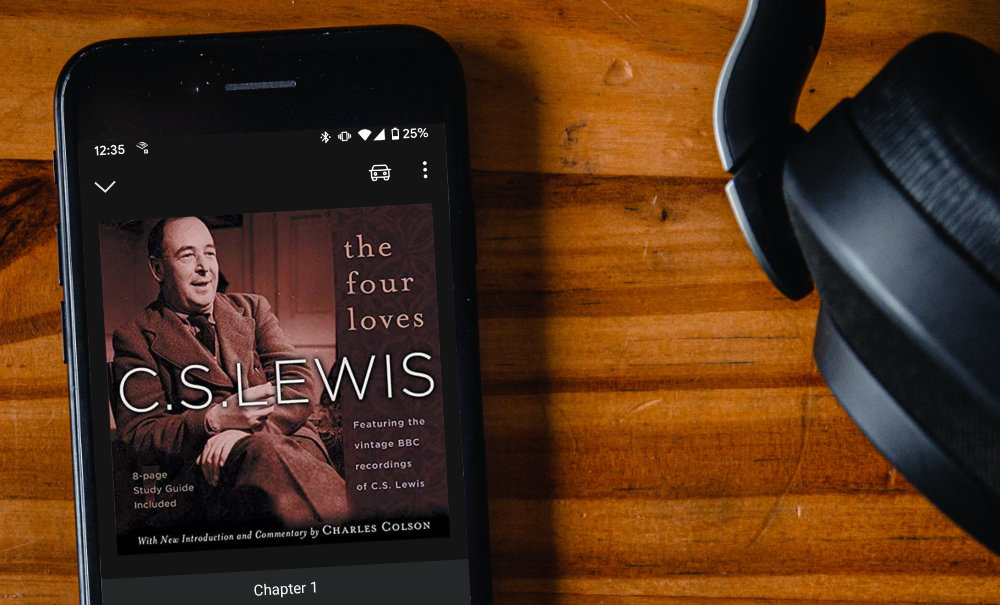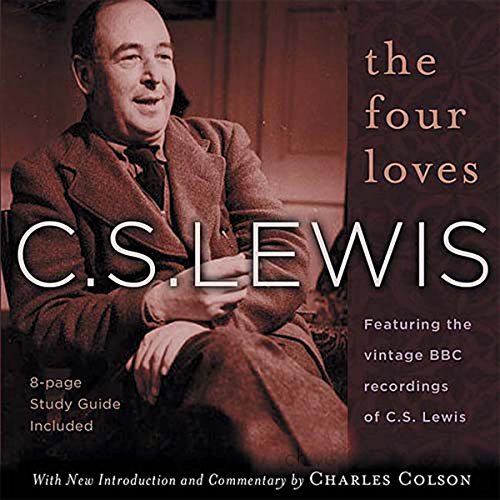

My dog Niso and I jumped in my little hatchback and hit the road. She is a fan of road trips; even more, she is a fan of “human time” without her younger affection-stealing sister Nala. We were headed to a halfway point to pick up video files the USPS failed to deliver on time. My dad has been mailing flash drives each week so I can put together his message for Sunday morning.
I am a huge fan of audio books while driving, and with less road time due to COVID and working from home I have amassed a large backlog in my Audible library. I found this gem awhile ago: C.S. Lewis personally lecturing on the content that later became The Four Loves. I found the idea of hearing C.S. Lewis live exciting. It is also short, so it was a great option for a car ride with the dog.
“And wuv, tru wuv, will fowow you foweva. So tweasure your wuv.”
The Impressive Clergyman, The Princess Bride
Love – Love is a huge topic. We are called to love. Jesus said love is pretty important [Mat 22:37-40]. In fact the Bible has a lot to say about love. As my dad humorously illustrates, the concepts of love are varied and nuanced. What do we mean when we say love? What are the differences in the love we feel towards various people, places and things in different moments and contexts? What is this love that we are called to as people seeking Jesus? In English, we say love but mean all sorts of things. Often we are not even aware of what we mean.
So what can we learn about love from a middle of the last century lecture series by a Brit in a big room with old recording technology? It turns out, quite a bit. His style is old. His language is challenging. His accent is British. His message is – enlightening. C.S. Lewis looks to the Greeks for help. They have more than one word for love (most languages do). Lewis’ lectures dive into four words describing very different things which we typically call love. How you love you mom, your cat, God or a Snickers bar are in fact very different and Lewis, in a very short amount of time teaches a master class on love.
I laughed a lot. Especially during Lewis’ lecture on Eros. So much in fact, that Niso felt the need to climb over the shifter to lick my face and make sure I was okay (a lovable three-legged, 52 lb mutt with an aggressive tongue hopping all over a manual transmission Ford Focus certainly makes life interesting!) Lewis’ illustrations come from a different time and place but remain relatable. The distance between myself and his message actually accentuated many of his ideas as the language and style were often unfamiliar and thought provoking. As a result, I have spent a lot of time thinking about my own views of love. Which love do I expect from people and circumstances? Which love am I offering to those around me? Which love do I have for God and others – or myself? God is love, but not the pitying or affectionate love, erotic love or even friendship-y love. What on the surface seems so simple, is perhaps so very un-simple.
A better understanding of love, rather than ’42,’ may very well be the key to better understanding life, the universe and everything. C.S. Lewis’ words have traveled from the 1950’s to give me a lot think about and explore on the rich topic of love. Even now, days after my first listen I find myself exploring how I approach God and others. To me, this is the sign of a great read or listen: does is act as a catalyst to conversation with Jesus and a desire to know Him better or be more like Him?
C.S. Lewis—the great British writer, scholar, lay theologian, broadcaster, Christian apologist, and bestselling author of Mere Christianity, The Screwtape Letters, The Great Divorce, The Chronicles of Narnia, and many other beloved classics—contemplates the essence of love and how it works in our daily lives in one of his most famous works of nonfiction. Lewis examines four varieties of human love: affection, the most basic form; friendship, the rarest and perhaps most insightful; Eros, passionate love; charity, the greatest and least selfish. Throughout this compassionate and reasoned study, he encourages readers to open themselves to all forms of love—the key to understanding that brings us closer to God.
Many of the links on our site are affiliated, meaning you pay the same, but we make a small percentage for referring you. Thank you for your support!
